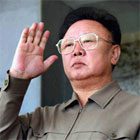Pyongyang unwrapped
Technology has revolutionised reporting on North Korea. David McNeill reveals how a clandestine network is getting the word out despite restrictions 
Technology has revolutionised reporting on North Korea. David McNeill reveals how a clandestine network is getting the word out despite restrictions 
Is China’s foreign policy shaped by national public opinion or is the government shaping public opinion to justify its foreign policy?
An interesting new analysis by the Brookings Institute has it that the government is manipulating nationalist sentiment to justify its own foreign policy decisions.
“On foreign policy issues, the Chinese public relies overwhelmingly on the official media for daily information, and the Chinese Communist Party (CCP) and the government plays a central role in determining what information will be available to the public. The Propaganda Department of the CCP is the political center for ideological control and news censorship. It has almost absolute authority over what the public will read and see through its control of the sources of information.”
On key foreign news stories, such as the Egyptian riots, media must use Xinhua wire reports. When the story is even more sensitive, such as disputes in the South China Sea even Xinhua is not to be trusted, it says. All media must use reports straight from the State Council itself.
The angle is carefully chosen to garner the desired response, according to the Institute.
“For example, Chinese media reports on the domestic turbulence in Libya and Syria in 2011 rarely focuses on the governments’ authoritarian records, human rights violations, or corruption. Instead, following China’s foreign policy principles, Chinese media spent most volume on the negative aspects of domestic instability and the danger of foreign intervention.”
The web, while having a little more leeway, is also heavily screened.
“Most discussion on the internet in China is carefully screened, and much of it is pre-approved, by the government―including inflammatory comments and nationalistic criticisms about foreign policy issues. If it wished to, therefore, the government could shape and influence the direction of the internet content and netizens’ discussions to tone down nationalistic sentiment. The fact that it does not in many cases raises the question not about its ability, but its intentions.”
As examples of how it has manipulated foreign news in the past, it picks out the Dalai Lama’s visit to the US in 2010 and American arms sales to Taiwan in the same year. The government knew about the visit and the sales months before, “yet when they were officially announced, Beijing responded in a ferocious manner. Harsh official statements were applauded and echoed by an even more agitated public, which in its more extreme examples called for sanctions on American companies and even a military confrontation with the United States.”
It could have handled the issues in a much more conciliatory way, it argues.
“The fact that it did not revealed several things,” it says. Firstly, it was enjoying its bigger role on the international stage due to its economic growth. And, “it saw public opinion as a useful tool to show Washington how angry the Chinese people are and how severe the consequences could be. Beijing might have a point when saying it had to answer to the public sentiment at home, but such a sentiment was at least in part its own creation to begin with. Public opinion was more instrumental than original in this case.”
The Chinese government appeals to nationalism as a way to “reaffirm its legitimacy in the eyes of the people,” given there are no free and fair elections in the country. It’s also a tool to bargain “concessions from foreign governments.”
Don’t jump too quickly to say Beijing is listening to its people, it warns. It’s much more likely that the people have been manipulated into saying what Beijing wants them to say.
International delegation to Bahrain calls for an end to free expression violations and for human rights defenders to be freed
Egyptian-American journalist Mona Eltahawy tweeted to say she had been arrested and beaten in Cairo this morning. Eltahawy, who writes for Canada’s Toronto Star, Israel’s The Jerusalem Report and Denmark’s Politiken, is said to have been detained by Police in Tahrir Square. Following her arrest, the journalist tweeted “Beaten arrested in interior ministry” around 4am (EET).
 Her arrest sparked outrage on Twitter, and the campaign to #FreeMona began trending worldwide.
Her arrest sparked outrage on Twitter, and the campaign to #FreeMona began trending worldwide.
It is also believed that activist Maged Butter, who was with Eltahawy, was also arrested, and a similar #freemaged campaign began on Twitter. Unconfirmed reports on the micro-blogging site suggest Maged has since been freed.
Also, documentary film-maker, Jehane Noujaim, best known for her documentary “Control Room” about the pan-Arab news station, Al-Jazeera, was detained, and her camera confiscated.
The US State department responded to the rumours of the arrests on Twitter: “Reports of @monaeltahawy and @pangeaworld detention very concerning. @USEmbassyCairo engaging authorities. #FreeMona“.
Images calling for the release of Mona and Maged also appeared on Twitter, as well as an image showing Maged’s injuries, following his release.
Mona tweeted “I AM FREE” shortly after 12.20 EET, and said she could barely type following “12 hours with Interior Ministry bastards and military intelligence combined.” Mona also alleged she had been sexually assaulted by 5 or 6 members of the Egyptian security forces, who “groped and prodded my breasts, grabbed my genital area.”